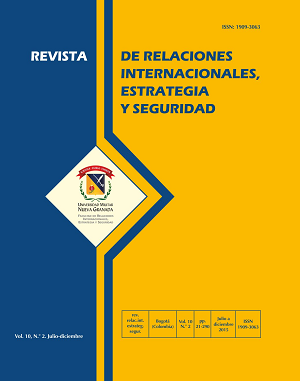O Irão Face à Asia Central: Um Balanço Geoestratégico
Resumo
O presente artigo visa contribuir para aumentar o conhecimento acerca de uma região remota, mas de extraordinária importância no contexto geopolítico atual –a Ásia Central– fruto da sua posição estratégica enquanto elo entre Oriente e Ocidente, espaço de competição entre as grandes potências. O argumento central é o de que o Irão demonstra um interesse fundamentalmente económico (a busca de recursos energéticos) relativamente à região, perseguindo uma política predominantemente realista em face de esta. Em alternativa à observação participante e não participante, privilegiou-se a entrevista semiestruturada. O trabalho de campo baseou-se em entrevistas conduzidas predominantemente na Ásia Central. O método qualitativo –através da análise hermenêutica– é a metodologia na qual se alicerça a presente investigação. Como recomendação estratégica, sugerimos que o Irão se inspire na política chinesa face à Ásia Central, que tem demonstrado uma vigor notável nos últimos anos, de forma a projetar o seu poder na esfera regional e a mitigar s efeitos da estratégia (fundamentalmente) isolacionista de Washington relativamente à região.
Downloads
##plugins.generic.ArticleMetadataByBiteca.languages##:
porReferências
Akbar, Z. (2012). Central Asia: The New Great Game. The Washington Review of Turkish & Eurasian Affairs. Recuperado de http://www.thewashingtonreview.org/articles/central-asia-the-new-great-game.html
Antunes, F. (2012). Entrevista pessoal. Lisboa.
Asimov, S. & Bosworth, E. (1998). History of civilizations of Central Asia, Vol. IV. UNESCO Publishing.
Blank, S. (1999). Every shark east of Suez: great power interests, policies and tactics. Transcaspian energy wars. Central Asian Survey, 18(2), 149-184. http://dx.doi.org/10.1080/02634939995669
Bradbury, D. (2011). Entrevista pessoal.
Buzan, B. (1991). People, states and fear: an agenda for international security studies in the postCold War. London: Hasvester Wheatsheaf.
Caravelli, J. (2011). Entrevista pessoal.
Central Asia Competitiveness Outlook, (2011).
Dilthey, W. (1894). Ideias acerca de uma Psicologia Descritiva e Analítica. Paris: Aubier.
Duarte, P. (2012). China looks to Central Asia. Boletim Mundorama 63(4), 1-12.
Edwards, M. (2003). The New Great Game and the new great gamers: disciples of Kipling and Mackinder. Central Asian Survey 22(1), 83-102. http://dx.doi.org/10.1080/0263493032000108644
Fonseca, P. (2011). Entrevista pessoal. Lisboa.
Freire, M. (2010). Key Players and Regional Dynamics in Eurasia: The Return of the 'Great Game'. Basingstoke: Palgrave MacMillan. http://dx.doi.org/10.1057/9780230290754
Guedes, A. (2011). Entrevista pessoal. Lisboa.
Herzig, E. (2004). Regionalism, Iran and Central Asia. International Affairs 80(3), 503-517. http://dx.doi.org/10.1111/j.1468-2346.2004.00395.x
Huasheng, Z. (2009). Central Asian Geopolitics and China's security. Strategic Analysis, 33(4), 475-492. http://dx.doi.org/10.1080/09700160902930979
Jomhouri Eslami editorial calls on leaders to exhibit caution and intelligence in view of the strengthening of Iranian currency following the nuclear talks. (2013, março 8), Iran Daily Brief. Recuperado de http://www.irandailybrief.com/2013/03/08/jomhouri-eslami-editorial-calls-on-leaders-to-exhibit-caution-and-intelligence-in-view-of-the-strengthening-of-iranian-currency-following-the-nuclear-talks-2/
Iran Eager to Further Expand Ties with Central Asia. (2013, abril 12). Islamic Invitation Turkey Recuperado de http://www.islamicinvitationturkey.com/2013/04/12/iran-eager-to-further-expand-ties-with-central-asia/
Khwaja, A. (2003). Pakistan and the New Great Game. IPRI Paper (5). April 5.
Linn, J. (2007). Central Asia - National Interests and Regional Prospects. China and Eurasia Forum Quarterly, 5(3).
Luft, G. & Korin, A. (2009). Energy Security Challenges for the 21st Century: A Reference Handbook. Contemporary Military, Strategic, and Security Issues. Santa Barbara: Praeger Security International.
Mackinder, H. (2004). The geographical pivot of history. The Geographical Journal, 170(4), 298-321. http://dx.doi.org/10.1111/j.0016-7398.2004.00132.x
Melo, F. (2012). Entrevista pessoal.
Morgenthau, H. (1978). Politics among Nations: The Struggle for Power and Peace. Nova Iorque: Alfred A. Knopf.
Ottinger, R. (2007). UNEP Handbook for Drafting Laws on Energy Efficiency and Renewable Energy Resources. New York: United Nations Environment Programme.
Saifutdinov, A. (2012). Entrevista pessoal.
Santos, V. (2007). Introdução à Teoria das Relações Internacionais. Referências de Enquadramento Teórico-Analítico. Lisboa: Instituto Superior de Ciências Sociais e Políticas.
Siitonen, L. (1990). Political Theories of Development Cooperation. A Study of Theories of International Cooperation. Helsinki: World Institute for Development Economics Research of the United Nations University.
Suvankulov, F. & Guc, Y. (2012). Who is Trading Well in Central Asia? A Gravity Analysis of Exports from the Regional Powers to the Region. Eurasian Journal of Business and Economics, 5(9), 21-43.
Therme, C. (2012). When Tehran looks at its regional environment. Iranian think tanks and their analysis of Central Asia. Washington DC: The George Washington University.
Witt, M. (2012). Why Tajikistan Won't Abandon the Islamic Republic of Iran. International Affairs Review, (2). Recuperado de http://www.iar-gwu.org/node/398
World Energy Outlook. International Energy Agency (2008).
Worley, W. (2006). Building ties that bind? The role of Central Asia in Chinese oil security. Paper presented at the annual meeting of the International Studies Association. Town & Country Resort and Convention Center, San Diego, California, USA.
Xu, X. (1999). The oil and gas links between Central Asia and China: a geopolitical perspective. OPEC review, 23(1), 33-54. http://dx.doi.org/10.1111/1468-0076.00057
Xuetang, G. (2006). The Energy Security in Central Eurasia: the Geopolitical Implications to China's Energy Strategy. China and Eurasia Forum Quarterly, 4(4), 117-137.
Yergin, D. (2006). Ensuring Energy Security. Foreign Affairs, 85(2), 69-82. http://dx.doi.org/10.2307/20031912












